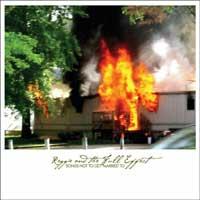It may be cliché to say, but adversity really does tend to bring out the best in people. Take the recent effort from Reggie And The Full Effect, Songs Not To Get Married To. It's hardly a secret that much of the album is inspired by James Dewees' recent divorce, and the result is the most solid collection of tracks from the project since Greatest Hits 84-87.
With Songs..., Dewees has ditched his goofy 'Paco' alter ego, and some, though not all, of the accompanying silliness. The past two records from the band saw a handful of strong tracks interspersed with far too many "joke" songs, and my experience with the growing ratio of jokes to songs on past albums certainly had me responding as I often do to joke albums; funny the first time, second time I'll skip.
The opening track "What The Hell is Contempt?" sees Dewees balancing his gentler singing with the raging id of Coalesce vocalist Sean Ingram, while "Get Well Soon" sees him becoming reacquainted with the arena size indie rock that populated the
first few Get Up Kids discs. Some may complain that the carefree, pop songwriting of Dewes is all but absent from Songs..., but in a sense, this darker, more melancholic record seems to have more long-term bite than the more transitory sounds of the two records which preceded it.
In one sense, Dewees doesn't stray far from the established sound of the band; it is still flush with thick guitars, fluid keyboard work and the occasionally dalliance into metal and 80's synth rock, but what has changed, certainly, is the tone of the compositions. A track like the raging "Trooth" would likely not have fit in so easily on Under The Tray, and its full on blast of metallic hardcore is as close as we're likely to get to a Coalesce reunion. (I say this now, but with the Casket Lottery defunct, it might actually happen. Cross your fingers.)
The record is still a little more laboured in its songwriting than the effortless poppy bliss of Greatest Hits 1984-1987, and some of the concept tracks in the second half of the record do fall flat, but with that in mind, the addition of a little gravitas has certainly re-inspired the Dewees songwriting machine, and that certainly isn't a bad thing.
